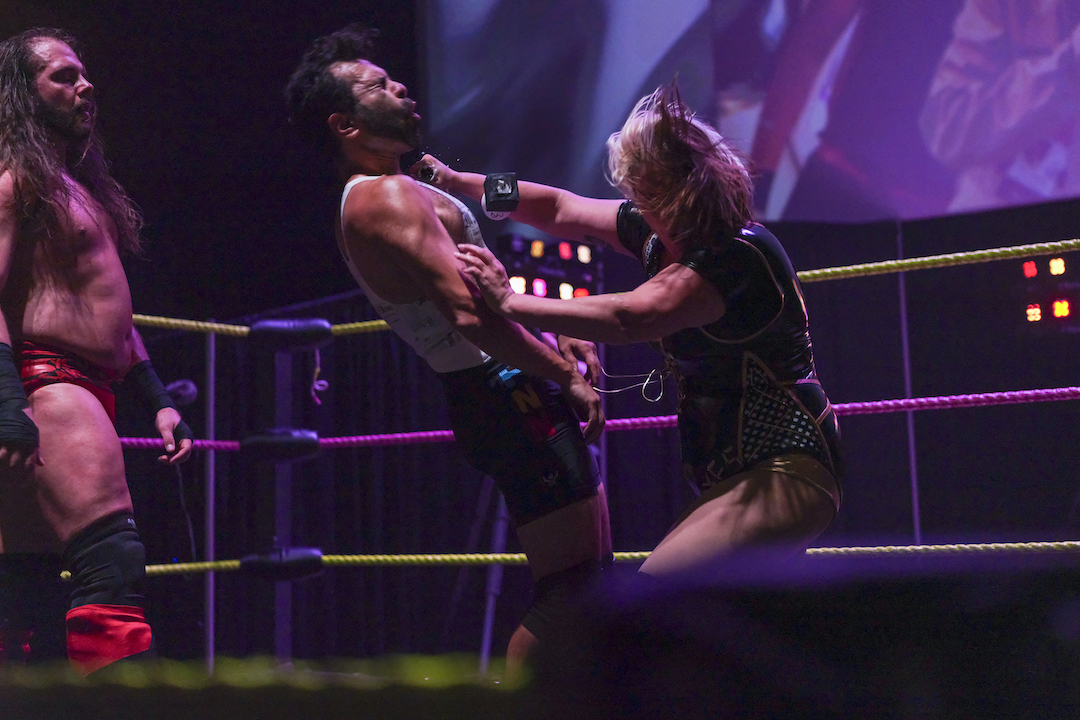Omar Mouallem says few know that what became Stampede Wrestling held its first-ever event in Edmonton in 1948.
"It was founded as Klondike Wrestling in Edmonton," Mouallem told Taproot. "It had its first show at the Edmonton Sales Pavilion (at Edmonton Northlands). The reason that it became part of Calgary lore is that about 10 years later (co-founder) Al Oeming … sold it in order to, I believe, start the Edmonton Game Farm."
Mouallem is the director of Making Kayfabe: The Private Lives of Indie Wrestlers, which streams on CBC Gem starting Feb. 23. It's the followup to his previous film, The Lebanese Burger Mafia.
He said Edmonton's deep wrestling history and its current renaissance are part of the inspiration.
"Some of my most core memories revolve around wrestling," Mouallem said, recalling trips from his childhood home in High Prairie to Edmonton to see World Wrestling Entertainment and Stampede Wrestling matches as a child. He stopped watching during WWE's notorious Attitude Era, but came back in "recent years" when he started a family and wanted something cheap and fun to do.
It was then that he noticed that wrestling had changed for the better. "There are a lot of promotions like Love Wrestling (in Edmonton) and WrestleCore in Vancouver, and many more all over North America, that are embracing something else — this fun, inclusive, and campy form of entertainment and performance art," Mouallem said.
The WWE once owned Stampede Wrestling. Mouallem said the organization bought up many independent clubs and had a near-monopoly on the sport during its zenith. He credits American alternative outfit All Elite Wrestling with taking back market share since its founding in 2019 and catalyzing a shift in wrestling culture, including here in Edmonton.
"It's a game changer," Mouallem said. "What I think AEW has also brought to it is this more inclusive culture, because they've had openly gay and trans wrestlers. I think it has helped to bring in a new audience. And I think, maybe more importantly, it's helped inspire a new generation of wrestlers, indie wrestlers, who maybe were previously afraid of the culture or the environment that they would be stepping in if they trained and got in the ring."
Making Kayfabe is not a talking heads documentary. Instead, Mouallem is the main subject, and he trained for three months with Michael Richard Blais of the Clandestine Wrestling Society to do so. The film culminates in a Clandestine— and Love Wrestling-presented match last June at The Rec Room's South Edmonton location. Mouallem, who's also an award-winning journalist and author, transformed into "Fake Nooz" Neville Anderson, a heel who drew the passionate ire of the audience.

From left: Michael Richard Blais, Omar Mouallem, and Taryn Kroll face off in the ring in a clip captured from Mouallem's new doc on indie wrestling, Making Kayfabe. (Supplied)
The match was a dream come true for a wrestling superfan — even if Mouallem picked up bruises doing it.
"I had a couple of injuries, but they were injuries that I got from making mistakes," he said. "It's really more like dance than anything else … If you learn to do it right and you understand the choreography, and you understand the collaboration and the sleight of hand tricks, it's basically theatre."
In the film, Mouallem shines the spotlight on Edmonton's indie wrestling scene and the talent that makes it vibrant. The film culminates with him in the ring with Taryn From Accounting (Taryn Kroll), TY Jackson (Ahmed Kheiri), and Blais on the Love Wrestling stage.
"I thought (Kroll) was representative of this moment that wrestling is having — a wrestling character that is an accountant whose whole gimmick is that she is a regular person," Mouallem said. "Her whole slogan is, 'There's only two things that are certain when you step in the ring with me: death and taxes.' It's great."
Kroll is actually a teacher, and this exemplifies the concept of kayfabe that's part of the film's name. In wrestling, the term describes living out a fantasy as a character without ever breaking the fourth wall to acknowledge the conceit — even though it's clearly an act of performance. Mouallem compared it to drag, and believes reality franchise RuPaul's Drag Race has helped audiences embrace the alter-ego aspect of wrestling.
Mouallem screens the film ahead of its Gem debut with a Q&A at a Love Wrestling and Clandestine event on Feb. 22.
Will "Fake Nooz" Neville be there? The answer to that would betray the kayfabe, Mouallem said.
